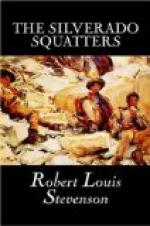Thither we went; the Jews, who should already have been miles into Lake County, still cheerily accompanying us. For about a furlong we followed a good road alone, the hillside through the forest, until suddenly that road widened out and came abruptly to an end. A canyon, woody below, red, rocky, and naked overhead, was here walled across by a dump of rolling stones, dangerously steep, and from twenty to thirty feet in height. A rusty iron chute on wooden legs came flying, like a monstrous gargoyle, across the parapet. It was down this that they poured the precious ore; and below here the carts stood to wait their lading, and carry it mill-ward down the mountain.
The whole canyon was so entirely blocked, as if by some rude guerilla fortification, that we could only mount by lengths of wooden ladder, fixed in the hillside. These led us round the farther corner of the dump; and when they were at an end, we still persevered over loose rubble and wading deep in poison oak, till we struck a triangular platform, filling up the whole glen, and shut in on either hand by bold projections of the mountain. Only in front the place was open like the proscenium of a theatre, and we looked forth into a great realm of air, and down upon treetops and hilltops, and far and near on wild and varied country. The place still stood as on the day it was deserted: a line of iron rails with a bifurcation; a truck in working order; a world of lumber, old wood, old iron; a blacksmith’s forge on one side, half buried in the leaves of dwarf madronas; and on the other, an old brown wooden house.
Fanny and I dashed at the house. It consisted of three rooms, and was so plastered against the hill, that one room was right atop of another, that the upper floor was more than twice as large as the lower, and that all three apartments must be entered from a different side and level. Not a window-sash remained.




